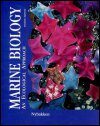![Marine Biology Marine Biology]()
Click to have a closer look
About this book
Contents
Biography
Related titles
About this book
Emphasises the ecological principles that govern marine life throughout all environments within the world's oceans. Its unique ecological approach adds real-world relevance by exploring how organisms interact within their individual ecosystems. The text is organised by habitat and each habitat receives detailed, in-depth coverage. The Fifth Edition is fully updated with the latest research data and topics, including expanded coverage of the human impact on oceans, oceanic dead zones, and coral reefs.
Contents
1. Introduction to the Marine Environment. Properties of Water. Basic Oceanography. Some Ecological Principles. Larvae and Larval Ecology. Comparison of Terrestrial and Marine Ecosystems. Division of the Marine Environment. 2. Plankton and Plankton Communities. The Phytoplankton. The Zooplankton. Floatation Mechanisms. Primary Production. Factors Affecting Primary Productivity. Primary Productivity of the Biosphere. The Ocean Ecosystem: The Classic Model. The Ocean Ecosystem: A Changing Model. 3. Oceanic Nekton. Composition of the Oceanic Nekton. Environmental Conditions. Adaptations of Oceanic Nekton. Ecology of Nekton. 4. Deep-Sea Biology. Zonation. Sampling the Deep Sea. Environmental Characteristics. Adaptations of Deep-Sea Organisms. Community Ecology of the Benthos. Midwater Community Ecology. 5. Shallow-Water Subtidal Benthic Associations. Environmental Conditions. Unvegetated Sedimentary Environments. Rocky Subtidal Communities. Kelp Beds and Forests. Seagrass Communities. Some Special Communities. Biology of Polar Seas. 6. Intertidal Ecology. Environmental Conditions. Adaptations of Intertidal Organisms. Rocky Shores. Cobble Beaches. Sandy Shores. Muddy Shores. Intertidal Fishes. Birds. 7. Meiofauna. Environmental Characteristics. Composition of the Interstitial Assemblages. Sampling and Extracting Meiofaunna. Adaptations. Ecology. 8. Estuaries and Salt Marshes. Types of Estuaries. Physical Characteristics of Estuaries. The Biota of Estuaries. Adaptations of Estuarine Organisms. Ecology of Estuaries. Salt Marshes. 9. Tropical Communities. Coral Reefs. Mangrove Forests. 10. Symbiotic Relationships. Symbioses of Algae and Animals. Symbioses Among Animals. 11. Human Impact on the Sea. Fisheries. Mariculture. Pollution. Marine Diseases. Drugs From the Sea. Global Warming and Sea Level Change. Concluding Remarks.
Customer Reviews
Biography
James W. Nybakken is a professor of biological sciences at the Moss Landing Marine Laboratories, a consortium operation of seven of the California State Universities. His research interests are in the feeding ecology of certain groups of predatory marine gastropod molluscs. Dr. Nybakken is a fellow of the California Academy of Sciences and has served as an officer in five scientific societies. Mark D. Bertness is the chair of the Department of Ecology and Evolutionary Biology at Brown University, where he has taught for 25 years. His areas of expertise include the ecology and conservation of natural shoreline communities, as well as salt-marsh and rocky-shore ecology and conservation, which he has studied extensively in South America. Dr. Bertness earned his Ph.D. from the University of Maryland in 1979.






















![Guide des Tuniciers de l'Europe de l'Ouest: Atlantique & Méditerranée [Guide to Western European Tunicates: Atlantic and Mediterranean]](http://mediacdn.nhbs.com/jackets/jackets_resizer_medium/26/263079.jpg?height=150&width=104)












